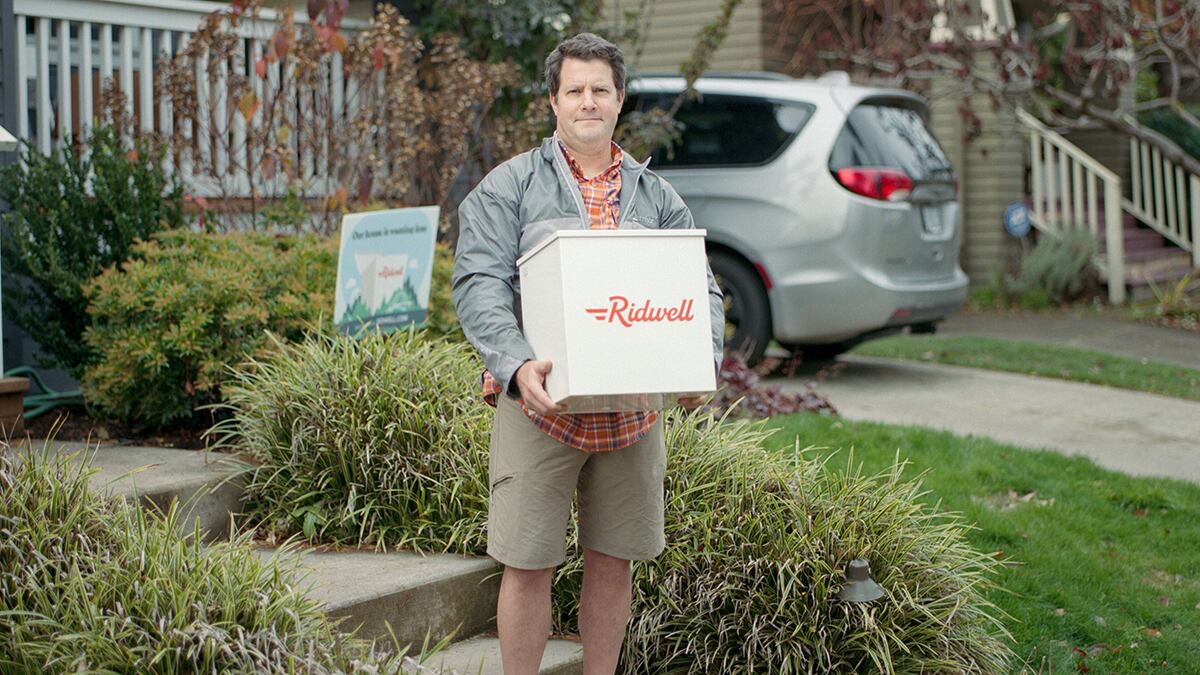Ridwell, the company that collects hard-to-recycle items from Portland-area doorsteps, today sued Washington County in federal court after county officials kicked the Seattle-based company out of unincorporated parts of the county.
Washington County argued that Ridwell is violating its exclusive franchise agreements with a limited number of trash haulers.
In a lawsuit filed in U.S. District Court on Jan. 21, Ridwell alleges Washington County is breaking Oregon law by prohibiting Ridwell’s service when it’s picking up items the franchised trash haulers don’t currently collect.
“In forcing Ridwell to cease operations, the County acted to impermissibly expand and protect the monopoly power of the Waste Haulers,” the lawsuit says. “This is an improper purpose; as such, the County has acted in contravention of the state law that grants the County a limited power to provide such monopolies, and its actions are accordingly preempted.”
Ridwell also alleges the county’s eviction of Ridwell “[runs] directly afoul of Oregon law, which requires that municipal waste management and recycling programs ‘extend the useful life of solid waste disposal sites by encouraging waste prevention and the recycling and reuse of materials…to the maximum extent feasible before disposal.’”
Thomas Egleston, manager of the county’s solid waste and recycling division, said he is not authorized to comment on pending litigation.
Ridwell is a subscription-based company that picks up items that shouldn’t be thrown in curbside trash and recycling bins, like batteries, light bulbs, threads, and plastic clamshells and foam. Over 20,000 households in the Portland area subscribe to the $12-to-$16-a-month service and have small white boxes on their doorstep from which Ridwell drivers pick up the contents every two weeks.
In December, WW chronicled the opposition Ridwell has encountered since it arrived in Oregon in late 2020.
For a year now, cities and counties surrounding Portland have worked to oust Ridwell from doorsteps, and both Washington and Clackamas counties were successful after sending Ridwell cease-and-desist letters and threatening enforcement action last fall. Ridwell exited unincorporated Clackamas County in December and then unincorporated Washington County in early January.
In its federal lawsuit, Ridwell argues that the county did not follow its own bylaws during the process of weighing whether to grant Ridwell an exemption to operate outside of the franchise system of trash hauliing.
Ridwell alleges that the county’s Garbage and Recycling Advisory Committee was improperly composed: Ridwell alleges there were at least two trash-industry representatives on the 10-member board, instead of the mandated one trash-industry representative.
The lawsuit calls the decision “fatally flawed” because of the alleged improper composition of the committee and further alleges a major conflict of interest on the committee that wasn’t disclosed.
Beth Vargas Duncan, president of the Oregon Refuse and Recycling Association, which represents the state’s franchised trash haulers, sat on the board when the Ridwell decision was made—even though her term had expired months before the vote, the lawsuit states.
Vargas Duncan had lobbied against granting Ridwell an exemption in both Portland and Washington County in the spring, telling county officials the trash haulers were eager to incorporate this service into their own agreements.
“Ms. Vargas Duncan also had a conflict of interest in the decision about Ridwell’s exemption due to both her professional role and a direct role in lobbying the County about the exact exemption at issue,” the lawsuit reads. “Ms. Vargas Duncan’s attorney stated that Ms. Vargas Duncan would disclose the potential conflict of interest at the relevant meetings, but she failed to do so in the GRAC meetings.”
Vargas Duncan did not respond to WW’s request for comment.
In the absence of Ridwell, the Washington County Board of Commissioners met this week and requested that county officials create a system where the franchised haulers would provide collection of additional items currently not picked up curbside—an idea the haulers have pushed since Ridwell arrived in late 2020.
But until that system is up and running, the board requested that “we temporarily adjust the rules to allow others to provide expanded recycling collection services so access to these services is not interrupted. That includes Ridwell.”
Those amendments will be discussed by the board on Jan. 25.
Caleb Weaver, Ridwell’s vice president of public affairs, says the temporary rule, if passed, would mean little to Ridwell.
“It doesn’t change the underlying issue that the code interoperation has been in violation of state law, and our request for a permanent exemption was improperly denied,” Weaver tells WW.
Ridwell says it had 1,600 members in Washington County prior to pulling out, which equates to more than $200,000 a year in revenue.
Ridwell continues to operate in Tualatin, Beaverton and Lake Oswego—despite those cities telling them to cease service. Its Portland operations were approved by the City Council last year.

